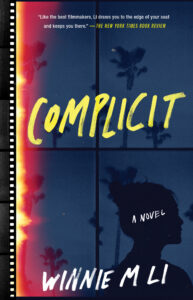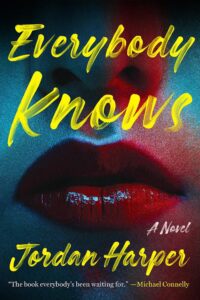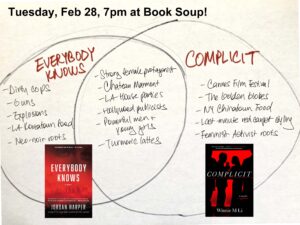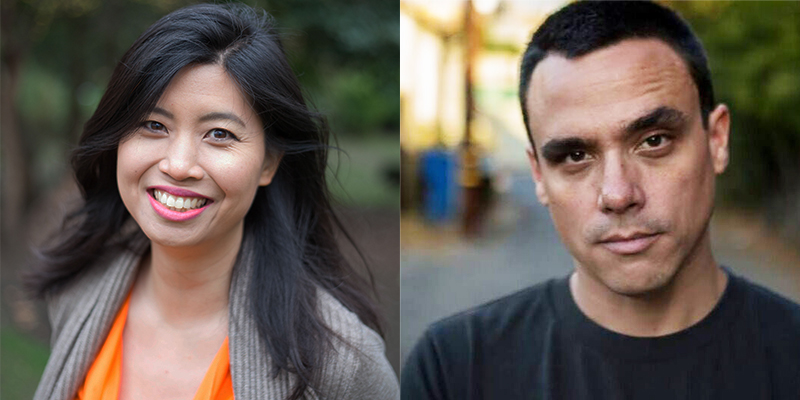Earlier this year, Winnie M Li and Jordan Harper sat down at the legendary BookSoup in Los Angeles, to discuss their recent novels Complicit and Everybody Knows, which are both mysteries set in Hollywood. The following are amended extracts from their conversation.
Jordan Harper: So we met at the Edgar awards. Five years ago, we were both nominated for Best First Novel.
Winnie Li: Jordan won. (laughs) It was well deserved.
JH: Five years later, I was working on a novel that became Everybody Knows. The working title was ‘Hollywood Sickos.’ When Winnie posted about her novel Complicit, I got very excited because I knew from her description of that book that we were circling this kind of same area. But knowing Winnie’s work and knowing mine, I knew we were going to come at it from completely different reasons. Where did this book come from, for you?
 WL: So [my first novel] Dark Chapter came out in 2017, and then suddenly, the Weinstein allegations happened. Having worked in the film industry, I wasn’t surprised when Weinstein was accused of doing these things to young women. I found it interesting how a lot of people just didn’t really understand the way the industry works, why this was happening, and why Weinstein was able to get away with it for so long. So I was like, ‘Maybe I can write a book that tries to capture what it’s actually like to work in the industry as a young woman, but told from a different perspective, from what we normally see in all the iterations of #MeToo.’ So that was it for me: can we structure the story in a way where a woman who left the industry ten years ago is forced to confront what she had done in the past, working for somebody like Weinstein, when a journalist approaches her? And is she complicit in what might have happened in the past or not?
WL: So [my first novel] Dark Chapter came out in 2017, and then suddenly, the Weinstein allegations happened. Having worked in the film industry, I wasn’t surprised when Weinstein was accused of doing these things to young women. I found it interesting how a lot of people just didn’t really understand the way the industry works, why this was happening, and why Weinstein was able to get away with it for so long. So I was like, ‘Maybe I can write a book that tries to capture what it’s actually like to work in the industry as a young woman, but told from a different perspective, from what we normally see in all the iterations of #MeToo.’ So that was it for me: can we structure the story in a way where a woman who left the industry ten years ago is forced to confront what she had done in the past, working for somebody like Weinstein, when a journalist approaches her? And is she complicit in what might have happened in the past or not?
So Jordan, your take on Everybody Knows… how did you come up with the idea?.. Obviously, your book is brilliant. But it’s a very, very different style [from mine]. And the perspective is what’s really interesting, because the main character May is a ‘black-bag publicist,’ right? Meaning… what’s her job?
 JH: The pocket definition is she doesn’t get the good news out, she keeps the bad news in. And so I’ve worked in television for 14 or 15 years now. And around the time of Harvey Weinstein, I got a chance to adapt James Ellroy’s LA Confidential into a TV show. We did it for CBS. And I created a scene that is not in the novel LA Confidential, where a young actress is on a casting couch, and the producer slides over and makes his move. And she manages to burn him with a cigarette and escape. And that show did not become a series because a man named Les Moonves decided not to make it a TV show. And while he was viewing that show with that scene, and he was currently under investigation for his eventual takedown [as an abuser]. So I had this weird brush with [#MeToo], but in a very specific way as a functionary in this world, who had seen how the sausage gets made. And that is the part that appealed to me. And I also had all this leftover James Ellroy energy because I didn’t get to make the TV show. So I knew I wanted to do an Ellroy-esque big epic story. And I knew I wanted to set it in Los Angeles. ..And going through that experience, as somebody who was part of the machine, I wanted to take my feelings about working in Hollywood and put them in a more exciting candy-coated shell.. I’m interested in power dynamics and the way power and money operate in this town. And while there is like sexual violence in my novel, I actually told my publicists and publisher: ‘I never wanted this referred to as a #MeToo novel, because I don’t think that that’s particularly my story to tell.’ I knew books like yours were coming and I wanted to position myself in a different place. My book is about the intermediaries, as opposed to either the victims or the perpetrators… So it’s really much more about the world of Los Angeles, and the way that power and corruption and police brutality and all that go through. But again, you can’t talk about those things, unfortunately, without talking about sexual violence.
JH: The pocket definition is she doesn’t get the good news out, she keeps the bad news in. And so I’ve worked in television for 14 or 15 years now. And around the time of Harvey Weinstein, I got a chance to adapt James Ellroy’s LA Confidential into a TV show. We did it for CBS. And I created a scene that is not in the novel LA Confidential, where a young actress is on a casting couch, and the producer slides over and makes his move. And she manages to burn him with a cigarette and escape. And that show did not become a series because a man named Les Moonves decided not to make it a TV show. And while he was viewing that show with that scene, and he was currently under investigation for his eventual takedown [as an abuser]. So I had this weird brush with [#MeToo], but in a very specific way as a functionary in this world, who had seen how the sausage gets made. And that is the part that appealed to me. And I also had all this leftover James Ellroy energy because I didn’t get to make the TV show. So I knew I wanted to do an Ellroy-esque big epic story. And I knew I wanted to set it in Los Angeles. ..And going through that experience, as somebody who was part of the machine, I wanted to take my feelings about working in Hollywood and put them in a more exciting candy-coated shell.. I’m interested in power dynamics and the way power and money operate in this town. And while there is like sexual violence in my novel, I actually told my publicists and publisher: ‘I never wanted this referred to as a #MeToo novel, because I don’t think that that’s particularly my story to tell.’ I knew books like yours were coming and I wanted to position myself in a different place. My book is about the intermediaries, as opposed to either the victims or the perpetrators… So it’s really much more about the world of Los Angeles, and the way that power and corruption and police brutality and all that go through. But again, you can’t talk about those things, unfortunately, without talking about sexual violence.
WL: Whereas I guess I’m a crime writer now, but that was never what I set out to be. My interest in writing about sexual violence clearly comes from my own experience. If I’d never been raped, I wouldn’t be writing about sexual violence, or maybe even crime. [My rape] opened my eyes to how prevalent sexual violence is in this world, how it impacts lives, how it’s protected within certain systems or even condoned.
JH: There is a genre that, to me, Complicit fits very neatly into. It’s a film genre called halogen core. It’s about office politics and industry [settings]. The Assistant [2020 film] is a version of halogen core…. She Said [the 2022 film] is halogen core. It’s these very close to the bone, very realistic attempts to display how these stories happen in the real world. [In Complicit], your description of Hollywood is so accurate and so detailed. And then, the more dangerous details creep in on the side and bubble to the surface. But it’s so grounded… That is one of the biggest differences between us: you write this very grounded story. And I write what I think is a very pulpy ,outrageous version of Los Angeles…. [With] that pulpy Ellroy style… I feel I can tell the truth better when I’m doing something that actually is loud and a little unreal, that captures the energy underneath everything.
WL: [My realism] probably stems from my experience as a survivor. where I’m going through life working in the film industry, and then suddenly, I am raped… How can I compare my actual lived experience with all the versions of rape that you’ve seen on screen?… Is it really like that in real life? When I came to actually writing my novels, I’m like ‘No, it has to be 100% realistic.’ Because otherwise, I’m doing a disservice to the lived experience, right? I don’t want to have the woman screaming as she’s pinned down, I don’t want to have all the slow motion shots. It needs to be realistic in its portrayal of trauma and the impact on an individual. So with Complicit, this material needs to be believable. Especially when you’re dealing with stories of young women who want to be actresses or Weinstein-like characters, it’s already so exaggerated by the media. It needs to be understandable why a young woman would act like this. And why she wouldn’t talk about it. So for me, it was like: portray it as accurately as you can. And then hopefully, you can get people to understand the situation better.
But [Jordan], let’s talk about your pulp roots! You come from the Ozarks…
JH: I was raised in a culture and in a family and a tradition where violence was just a part of the story. You know, I grew up in the world of Jesse James and Bonnie and Clyde. I had a grandfather who fed me these stories from my own family about police officers who were killed in the line of duty… So I grew up with ‘This is how you tell stories. This is what’s important, these matters of life and death.’ And so everything I’ve ever written has always existed in in that realm. It’s a way of telling really deep human truths with this kind of shell… Violence when done appropriately is thrilling in fiction, and I don’t run away from that. And I don’t deny that. And I think that allows you to get into these very unsafe spaces… I come from a noir tradition where you want to get in the head of people who do bad things. [Everybody Knows] is about May and her boyfriend Chris, who is a former corrupt cop, who was as bad as they come and now is working for a lawyer to cover up things using muscle instead of PR. These are people making bad choices, and you have to put them in a world where..you can deal with whatever the bad things are inside you. I think that is where noir really excels… A pulp setting introduces this dialectic of violence and wrongdoing and goodness that is important for people to explore. And you can do it without being preachy, by throwing in hammer parties and the Chateau Marmont, which you have in your book as well…
My book starts right here on Sunset Boulevard with May standing outside the secret entrance to the Chateau Marmont. You guys all know, there’s a green cloth door on the wall over there that if you slash it with a razor (it’s just made of cloth), you could go and be in the private grottos, which is where, since the 1930s, the best, weirdest, darkest, most awful parties in the world have taken place. And all that’s ever stopping you from going in there is a cloth door. So nobody ever goes. And I find that so fascinating.
WL: But that’s such a metaphor for the flimsy facade between the darkness that you don’t normally see, and the bright, shiny ‘This is what Hollywood is supposed to be [image], because this is how it’s portrayed.’ For me, that kind of image, the façade — that’s central to Complicit….
I went to the Oscars, and it was completely underwhelming and also ridiculous, at the same time. You have to run around and you have to borrow this dress [to walk the red carpet] and you have to borrow this jewelry, just to actually be allowed to be in the space. And then you have to give it back the next day. The borrowed nature of everything, the facade that exists in this industry. In this town. So that’s what I wanted to look at with Complicit: how everything’s a construction. The glamour is manufactured. You don’t have a film that just wins an award. There’s a massive campaign that happens behind that. So this sense of the machinery, which is hidden behind this glossy façade. Then you’re dealing with experiences of sexual violence, the nasty, unpleasant side of the film industry, all the inequalities hidden behind this myth that you can make it out in Hollywood. ‘You can head out there as a bright-eyed, eager individual and have your shining career, right?’ And that’s the opposite for so many people.

JH: The facade is a big part of what [my protagonist] May does, but it is also so weird to say the lie is so true. But the lie is so true…. I read an article in Deadline about a TV show I used to work on. And it was news, but [for] every sentence that I had direct knowledge of whether or not it was true or false? It was false. Every single thing that I read that I could verify was either spun or a lie or covering up the truth.
WL: [With Complicit] I didn’t want the straightforward story of a pretty young white actress who meets her demise… For me, as an Asian-American woman, it was important that my protagonist had to be Asian American, because you don’t see that so often. ..
So [my protagonist] Sarah has no interest in being on screen. She’s interested in the behind the scenes elements of putting a film together. And that came from my own experience as an aspiring producer back in the day. In some way, she’s got a certain attitude towards these pretty young white actresses that want to be stars, which is maybe a little dismissive of them. And so she herself has her own set of judgments. But then she’s obviously operating in a system where there’s a very powerful man, this financier who shows up and says he’s gonna foot the bill for the production….
My experience working for an independent film production company in London was that you were constantly looking for money. Here’s the script. And here’s the director. And here’s a great project, but we need $3 million to make it happen… If somebody had just showed up and said, ‘I’ll write the check,’ of course, you’d go for that, right? This Faustian pact that you make, because you literally need the money to make a film.
JH: The Faustian bargain is a lot of what I think about. My book is very much me trying to wrestle with the idea of: is it really possible to ethically work in Hollywood at all?…
[In my research], I sat down with real black bag publicists, who worked for a very, very bad man. And they said things to me in that meeting that I could not believe they said, some of which are in the book. They said to me, the line that’s in the book: ‘I’m not saying the truth isn’t important. It just doesn’t matter.’ And then they said to me: ‘So he was accused of rape. Everybody rapes.’
WL: But it’s that casualness… by having that kind of attitude, aren’t we all being complicit?
***
Winnie Li is the author of Complicit, now available in paperback.
Jordan Harper is the author of Everybody Knows.

















